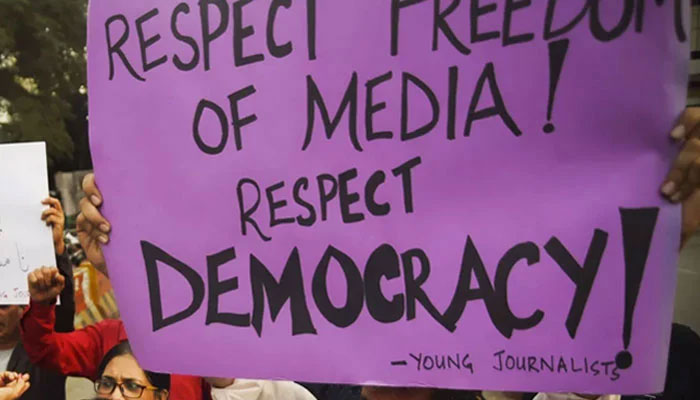Journalists not welcome
The current year is not yet half gone and already five journalists have been killed since the start of 2024
Pakistan has consistently been one of the most dangerous countries for journalists over the last two decades or so, with an estimated 90 journalists killed between 2002 and 2022. The current year is not yet half gone and already five journalists have been killed since the start of 2024 as per Reporters Without Borders, matching the total for the entire year of 2022. Senior journalist Khalil Jibran was the latest addition to this gruesome tally, shot dead by unidentified individuals near his residence in Landi Kotal, Khyber Pakhtunkhwa. The former president of the Landi Kotal Press Club, died on the spot and, in the aftermath of the attack, the district police officer reportedly claimed that Jibran had received threats from terrorists. His death comes just a month after the killing of 40-year-old journalist Nasrullah Gadani who worked with a Sindhi daily called ‘Awami Awaz’. Gadani was also shot and killed by some unidentified armed men in Ghokti, Sindh. Such persistently high levels of violence against a particular profession or group are not possible without a climate of relative impunity. As such, Pakistan ranked as the 11th worst country in the world when it comes to prosecuting killers of journalists on the Committee to protect Journalists’ (CJP) 2023 Global Impunity Index. According to the index, there were at least eight unsolved murders of journalists in the country as of last year, a total that may well have increased by now.
So why exactly has it been open season on journalists in Pakistan for so long and when exactly can we expect it to end? A trend that has sustained itself for over almost two decades cannot be pinned on any temporary instability or anti-media campaigns, at least not entirely. One has to look at the nature of what journalists do for a more complete understanding of what puts them in so much danger in Pakistan. Ideally, journalism is about unearthing the truth, ensuring the people are informed about what is going on around them and that the powerful are always held to account. If one has been paying attention, they would know that Pakistan’s modus operandi is often the very opposite of these journalistic principles. The truth is to be buried or ignored, especially in the corridors of power, the people must not know any more than what is good for them, even if it means shutting down certain social media platforms now and again and the powerful often feel entitled to do what they want and get away with it. These ingredients make journalism one of the country’s most dangerous professions.
Of course, one can also point to the fact that the country’s justice system and law enforcement often fail people regardless of their job or background. This is mostly true and improving the institutions responsible for upholding the law would indeed make journalists a lot safer. However, the violence, threats and harassment Pakistani journalists experience cannot be divorced from the fact that this is also one of the most stifled professions in the country and it is often the state that journalists are most worried about, with dozens currently in prison. Their crime is often simply doing their job. In a nutshell, Pakistan is not a country that welcomes truth-seekers. Until this changes the country will remain a dangerous place for journalists, at least those that do their job.
-
 Princess Beatrice, Eugenie Are ‘not Innocent’ In Epstein Drama
Princess Beatrice, Eugenie Are ‘not Innocent’ In Epstein Drama -
 Reese Witherspoon Goes 'boss' Mode On 'Legally Blonde' Prequel
Reese Witherspoon Goes 'boss' Mode On 'Legally Blonde' Prequel -
 Chris Hemsworth And Elsa Pataky Open Up About Raising Their Three Children In Australia
Chris Hemsworth And Elsa Pataky Open Up About Raising Their Three Children In Australia -
 Record Set Straight On King Charles’ Reason For Financially Supporting Andrew And Not Harry
Record Set Straight On King Charles’ Reason For Financially Supporting Andrew And Not Harry -
 Michael Douglas Breaks Silence On Jack Nicholson's Constant Teasing
Michael Douglas Breaks Silence On Jack Nicholson's Constant Teasing -
 How Prince Edward Was ‘bullied’ By Brother Andrew Mountbatten Windsor
How Prince Edward Was ‘bullied’ By Brother Andrew Mountbatten Windsor -
 'Kryptonite' Singer Brad Arnold Loses Battle With Cancer
'Kryptonite' Singer Brad Arnold Loses Battle With Cancer -
 Gabourey Sidibe Gets Candid About Balancing Motherhood And Career
Gabourey Sidibe Gets Candid About Balancing Motherhood And Career -
 Katherine Schwarzenegger Shares Sweet Detail From Early Romance Days With Chris Pratt
Katherine Schwarzenegger Shares Sweet Detail From Early Romance Days With Chris Pratt -
 Jennifer Hudson Gets Candid About Kelly Clarkson Calling It Day From Her Show
Jennifer Hudson Gets Candid About Kelly Clarkson Calling It Day From Her Show -
 Princess Diana, Sarah Ferguson Intense Rivalry Laid Bare
Princess Diana, Sarah Ferguson Intense Rivalry Laid Bare -
 Shamed Andrew Was With Jeffrey Epstein Night Of Virginia Giuffre Assault
Shamed Andrew Was With Jeffrey Epstein Night Of Virginia Giuffre Assault -
 Shamed Andrew’s Finances Predicted As King ‘will Not Leave Him Alone’
Shamed Andrew’s Finances Predicted As King ‘will Not Leave Him Alone’ -
 Expert Reveals Sarah Ferguson’s Tendencies After Reckless Behavior Over Eugenie ‘comes Home To Roost’
Expert Reveals Sarah Ferguson’s Tendencies After Reckless Behavior Over Eugenie ‘comes Home To Roost’ -
 Bad Bunny Faces Major Rumour About Personal Life Ahead Of Super Bowl Performance
Bad Bunny Faces Major Rumour About Personal Life Ahead Of Super Bowl Performance -
 Sarah Ferguson’s Links To Jeffrey Epstein Get More Entangled As Expert Talks Of A Testimony Call
Sarah Ferguson’s Links To Jeffrey Epstein Get More Entangled As Expert Talks Of A Testimony Call




